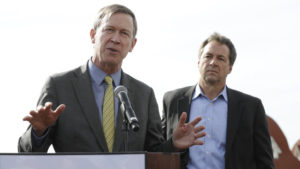
The past few weeks have seen more candidates jump into the increasingly crowded competition for the Democratic presidential nomination in 2020. Former Colorado Gov. John Hickenlooper launched his campaign last week, describing himself as an ‘extreme moderate’, and former Obama administration Housing and Urban Development Secretary Julian Castro was the first major candidate to announce his bid in early January. Meanwhile, Montana’s Gov. Steve Bullock has visited the pivotal early-voting state of Iowa multiple times seemingly in preparation for his own bid.
All three of these candidates doubtlessly possess political strengths. Hickenlooper’s home state underwent a dramatic economic resurgence during his two terms, Bullock is a popular two-term governor in a deep-red state, and Castro would be the nation’s first Latino president. Yet, as a recent Morning Consult poll shows, all three are extreme long-shots, each registering only one percent far behind frontrunners former Vice President Joe Biden and Sen. Bernie Sanders. The increasing likelihood of Biden entering the fray may corner the market on the pragmatic centrism preached by both Hickenlooper and Bullock, whereas the potential entrance of fellow Texan, former Rep. Beto O’Rourke, would diminish the constituency for Castro’s candidacy. With their odds low, Hickenlooper, Bullock, and Castro should consider redirecting their attention to the Senate, where they could pose formidable challenges to incumbent Republicans and be pivotal figures in the Democrats’ quest to take back the chamber.
Perhaps the most vulnerable seat is in Hickenlooper’s native Colorado, where Sen. Cory Gardner is up for re-election in a state that voted for Hillary Clinton in 2016, and Barack Obama twice. Senate Minority Leader Chuck Schumer (D-NY) has also landed top-flight candidates like former astronaut Mark Kelly, and potentially Georgia gubernatorial nominee Stacey Abrams to take on incumbents in opportune pickup states like Arizona and Georgia. Yet, in order to win back the Senate, the Democrats would have to gain four Republican seats and hope Sen. Doug Jones (D-AL) can reprise his unlikely 2017 victory. Thus, the Democrats need to expand their traditional map and recruit well-known candidates in deep-red states. Bullock and Castro would fit the bill. Bullock has been described as the only Democrat who could conceivably beat Republican Senator Steve Daines in Montana, while Castro, the former mayor of San Antonio, would prove a formidable opponent for former Majority Whip, Senator John Cornyn (R-TX) in a state whose large Latino population makes it increasingly contestable for Democrats.
Controlling the Senate would allow the Democrats to pass the sweeping, progressive legislation like universal child care and Medicare-for-All proposed on the campaign trail, prevent the Supreme Court from becoming even more conservative and wrest power from Republican Majority Leader Mitch McConnell and his band of Trump enablers. Yet, Hickenlooper and Bullock have both rejected the idea of shifting their focus to a Senate challenge. With the importance of the Senate in mind, fringe candidates like Hickenlooper, Bullock, and Castro should recognize they can contribute more as a pivotal Democratic vote in the Senate rather than a seventh-place finisher in the Iowa caucuses, and abandon their quixotic presidential aspirations to help their party on the down-ballot.
George Zhai



